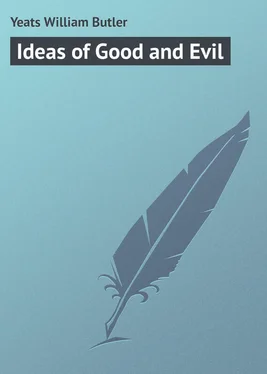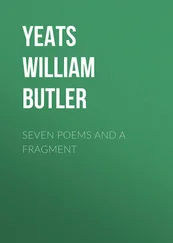William Yeats - Ideas of Good and Evil
Здесь есть возможность читать онлайн «William Yeats - Ideas of Good and Evil» — ознакомительный отрывок электронной книги совершенно бесплатно, а после прочтения отрывка купить полную версию. В некоторых случаях можно слушать аудио, скачать через торрент в формате fb2 и присутствует краткое содержание. Жанр: foreign_prose, на английском языке. Описание произведения, (предисловие) а так же отзывы посетителей доступны на портале библиотеки ЛибКат.
- Название:Ideas of Good and Evil
- Автор:
- Жанр:
- Год:неизвестен
- ISBN:нет данных
- Рейтинг книги:3 / 5. Голосов: 1
-
Избранное:Добавить в избранное
- Отзывы:
-
Ваша оценка:
- 60
- 1
- 2
- 3
- 4
- 5
Ideas of Good and Evil: краткое содержание, описание и аннотация
Предлагаем к чтению аннотацию, описание, краткое содержание или предисловие (зависит от того, что написал сам автор книги «Ideas of Good and Evil»). Если вы не нашли необходимую информацию о книге — напишите в комментариях, мы постараемся отыскать её.
Ideas of Good and Evil — читать онлайн ознакомительный отрывок
Ниже представлен текст книги, разбитый по страницам. Система сохранения места последней прочитанной страницы, позволяет с удобством читать онлайн бесплатно книгу «Ideas of Good and Evil», без необходимости каждый раз заново искать на чём Вы остановились. Поставьте закладку, и сможете в любой момент перейти на страницу, на которой закончили чтение.
Интервал:
Закладка:
I cannot now think symbols less than the greatest of all powers whether they are used consciously by the masters of magic, or half unconsciously by their successors, the poet, the musician and the artist. At first I tried to distinguish between symbols and symbols, between what I called inherent symbols and arbitrary symbols, but the distinction has come to mean little or nothing. Whether their power has arisen out of themselves, or whether it has an arbitrary origin, matters little, for they act, as I believe, because the great memory associates them with certain events and moods and persons. Whatever the passions of man have gathered about, becomes a symbol in the great memory, and in the hands of him who has the secret, it is a worker of wonders, a caller-up of angels or of devils. The symbols are of all kinds, for everything in heaven or earth has its association, momentous or trivial, in the great memory, and one never knows what forgotten events may have plunged it, like the toadstool and the ragweed, into the great passions. Knowledgeable men and women in Ireland sometimes distinguish between the simples that work cures by some medical property in the herb, and those that do their work by magic. Such magical simples as the husk of the flax, water out of the fork of an elm-tree, do their work, as I think, by awaking in the depths of the mind where it mingles with the great mind, and is enlarged by the great memory, some curative energy, some hypnotic command. They are not what we call faith cures, for they have been much used and successfully, the traditions of all lands affirm, over children and over animals, and to me they seem the only medicine that could have been committed safely to ancient hands. To pluck the wrong leaf would have been to go uncured, but, if one had eaten it, one might have been poisoned.
VIII
I have now described that belief in magic which has set me all but unwilling among those lean and fierce minds who are at war with their time, who cannot accept the days as they pass, simply and gladly; and I look at what I have written with some alarm, for I have told more of the ancient secret than many among my fellow-students think it right to tell. I have come to believe so many strange things because of experience, that I see little reason to doubt the truth of many things that are beyond my experience; and it may be that there are beings who watch over that ancient secret, as all tradition affirms, and resent, and perhaps avenge, too fluent speech. They say in the Aran Islands that if you speak overmuch of the things of Faery your tongue becomes like a stone, and it seems to me, though doubtless naturalistic reason would call it Auto-suggestion or the like, that I have often felt my tongue become just so heavy and clumsy. More than once, too, as I wrote this very essay I have become uneasy, and have torn up some paragraph, not for any literary reason, but because some incident or some symbol that would perhaps have meant nothing to the reader, seemed, I know not why, to belong to hidden things. Yet I must write or be of no account to any cause, good or evil; I must commit what merchandise of wisdom I have to this ship of written speech, and after all, I have many a time watched it put out to sea with not less alarm when all the speech was rhyme. We who write, we who bear witness, must often hear our hearts cry out against us, complaining because of their hidden things, and I know not but he who speaks of wisdom may not sometimes in the change that is coming upon the world, have to fear the anger of the people of Faery, whose country is the heart of the world – ‘The Land of the Living Heart.’ Who can keep always to the little pathway between speech and silence, where one meets none but discreet revelations? And surely, at whatever risk, we must cry out that imagination is always seeking to remake the world according to the impulses and the patterns in that great Mind, and that great Memory? Can there be anything so important as to cry out that what we call romance, poetry, intellectual beauty, is the only signal that the supreme Enchanter, or some one in His councils, is speaking of what has been, and shall be again, in the consummation of time?
1901.THE HAPPIEST OF THE POETS
I
Rossetti in one of his letters numbers his favourite colours in the order of his favour, and throughout his work one feels that he loved form and colour for themselves and apart from what they represent. One feels sometimes that he desired a world of essences, of unmixed powers, of impossible purities. It is as though the last judgment had already begun in his mind and that the essences and powers, which the divine hand had mixed into one another to make the loam of life, fell asunder at his touch. If he painted a flame or a blue distance, he painted as though he had seen the flame out of whose heart all flames had been taken, or the blue of the abyss that was before all life; and if he painted a woman’s face he painted it in some moment of intensity when the ecstasy of the lover and of the saint are alike, and desire becomes wisdom without ceasing to be desire. He listens to the cry of the flesh till it becomes proud and passes beyond the world where some immense desire that the intellect cannot understand mixes with the desire of a body’s warmth and softness. His genius like Shelley’s can hardly stir but to the rejection of nature, whose delight is profusion, but never intensity, and like Shelley’s it follows the Star of the Magi, the Morning and Evening Star, the mother of impossible hope, although it follows through deep woods, where the Star glimmers among dew-drenched boughs and not through ‘a wind-swept valley of the Apennine.’ Men like him cannot be happy as we understand happiness, for to be happy one must delight like nature in mere profusion, in mere abundance, in making and doing things, and if one sets an image of the perfect before one it must be the image that draws her perpetually, the image of a perfect fulness of natural life, of an Earthly Paradise. One’s emotion must never break the bonds of life, one’s hands must never labour to loosen the silver cord, one’s ears must never strain to catch the sound of Michael’s trumpet. That is to say, one must not be among those that would have prayed in old times in some chapel of the Star, but among those who would have prayed under the shadow of the Green Tree, and on the wet stones of the Well, among the worshippers of natural abundance.
II
I do not think it was accident, so subtle are the threads that lead the soul, that made William Morris, who seems to me the one perfectly happy and fortunate poet of modern times, celebrate the Green Tree and the goddess Habundia, and wells and enchanted waters in so many books. In The Well at the World’s End green trees and enchanted waters are shown to us, as they were understood by old writers, who thought that the generation of all things was through water; for when the water that gives a long and a fortunate life and that can be found by none but such a one as all women love is found at last, the Dry Tree, the image of the ruined land, becomes green. To him indeed as to older writers Well and Tree are all but images of the one thing, of an ‘energy’ that is not the less ‘eternal delight’ because it is half of the body. He never wrote, and could not have written, of a man or woman who was not of the kin of Well or Tree. Long before he had named either he had made his ‘Wanderers’ follow a dream indeed, but a dream of natural happiness, and all the people of all his poems and stories from the confused beginning of his art in The Hollow Land to its end in The Sundering Flood , are full of the heavy sweetness of this dream. He wrote indeed of nothing but of the quest of the Grail, but it was the Heathen Grail that gave every man his chosen food, and not the Grail of Malory or Wagner; and he came at last to praise, as other men have praised the martyrs of religion or of passion, men with lucky eyes and men whom all women love.
Читать дальшеИнтервал:
Закладка:
Похожие книги на «Ideas of Good and Evil»
Представляем Вашему вниманию похожие книги на «Ideas of Good and Evil» списком для выбора. Мы отобрали схожую по названию и смыслу литературу в надежде предоставить читателям больше вариантов отыскать новые, интересные, ещё непрочитанные произведения.
Обсуждение, отзывы о книге «Ideas of Good and Evil» и просто собственные мнения читателей. Оставьте ваши комментарии, напишите, что Вы думаете о произведении, его смысле или главных героях. Укажите что конкретно понравилось, а что нет, и почему Вы так считаете.












